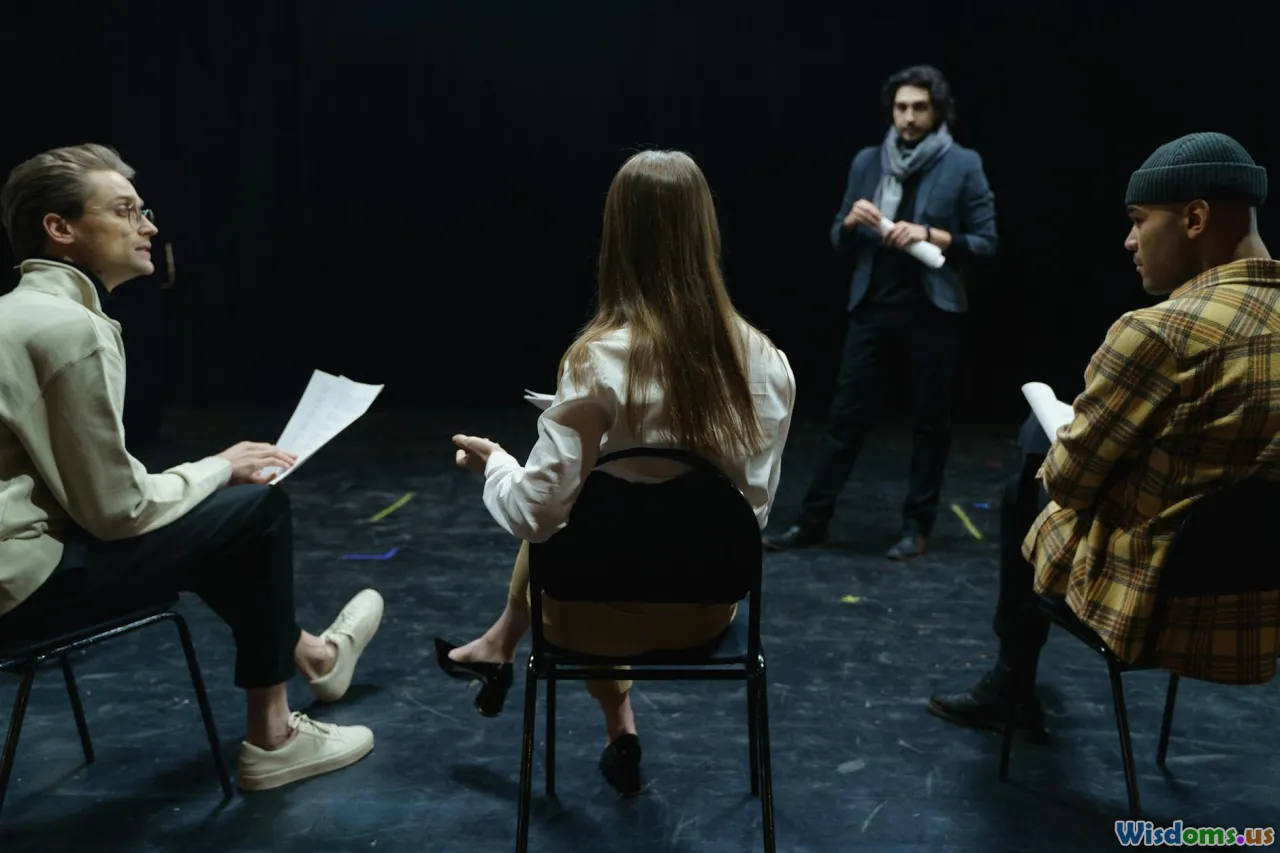
Will Ted Lasso End as Fans Predict
16 min read Exploring if Ted Lasso’s finale will match fan theories, featuring predictions, character arcs, and official insights. (0 Reviews)
Will Ted Lasso End as Fans Predict?
From its first heartwarming episodes, Apple TV+'s Ted Lasso has charmed millions with optimism, irreverent humor, and an unshakable belief in the power of kindness. As the original series moves toward its conclusion, fans everywhere are speculating not just if Ted Lasso will have a happy ending—but how it will achieve it. With theories growing as rapidly as AFC Richmond’s fanbase, it’s time to scrutinize: Will Ted Lasso end as fans predict, or deliver one final, surprising twist?
The Heart of the Show: More than Just Football

At its core, Ted Lasso is ostensibly about soccer—a struggling English football club, AFC Richmond, and an American coach thoroughly unfamiliar with the Premier League or Europe's passion for the sport. But as anyone who’s watched more than a single episode knows, Richmond's journey extends far beyond trophies and goal differentials.
Ted Lasso is a show about people: their vulnerabilities, ambitions, and growth. It’s about tackling anxiety and depression, facing the scars of failure and family trouble, and, most importantly, learning how vulnerability can build bridges in even the most competitive of environments. Take Rebecca Welton, the club's initially scheming owner, who evolves from vengeful ex-wife to a beloved community leader. Or Jamie Tartt, the self-absorbed striker who slowly learns humility both on and off the field.
Football is the backdrop—a unifying stage for personal transformation. Every tackle and every goal reflect life’s obstacles and victories. When fans speculate about the show's end, the big question is whether its final episodes will stick to the familiar playbook or challenge viewers, emphasizing not just winning on the field, but achieving peace and purpose off of it.
Fan Theories Heating Up: What Are They Predicting?

As ‘three-season arc’ rumors gained traction following comments from both Jason Sudeikis and showrunner Bill Lawrence, social media exploded with predictions for Ted and the gang's fate. On Reddit, Twitter, and fan podcasts, several main theories have taken shape:
1. Ted Goes Home
Arguably the leading prediction is that Ted Lasso will return to the United States, reuniting permanently with his son Henry. Viewers point to Ted’s lingering homesickness, often reflected in bittersweet phone calls to Kansas and the ever-present picture of his son by his bedside. Emotional, funny, and tinged with reality, this ending would echo season-long themes of family and personal fulfillment.
Example: In Season 2, Ted's panic attack and decision to open up about his mental health to others suggest a man seeking coherence—between his work, values, and heart back home.
2. Richmond Triumphs
Another popular prediction: Richmond, once the ultimate underdogs, will take home the Premier League title or, at minimum, secure a major cup upset, validating Lasso's unorthodox methods. Such a victory would offer both a satisfying payoff to season-long plots and serve as metaphorical affirmation of the series' belief in optimism and teamwork over cynicism and ego.
Fact: AFC Richmond’s ascent, mirrored in their improvement each season, tracks closely with real-life examples of football teams beating dire odds—a real embodiment of “believe.”
3. Rebecca Finds Love (or Family)
Given Rebecca’s long arc from the heartbreak of divorce to self-acceptance, many believe her ending will involve another step toward emotional fulfillment—perhaps reconciling with her ex, beginning a new relationship, or even adopting. Touches like her recurring ‘mystery dating app’ plot line have fueled these expectations.
4. Nate’s Redemption
Fans speculate Nathan Shelley—transformed from Ted’s protégé to rival manager—will ultimately reconcile with Ted and Richmond, learning to harness ambition without malice.
Insight: Nate’s arc, veering sharply into antagonism but leaving regular hints at self-doubt and regret, telegraphs classic redemption storytelling. Similar beats have played out in many “enemies-to-allies” sports narratives.
These theories reveal not just curiosity but deep emotional investment—and illuminate how Ted Lasso taps our hunger for both fairy-tale endings and hard-won real-world growth.
Historical Context: Does 'Feel-Good' Necessarily Mean Predictable?

Viewers love to root for cathartic, ‘feel-good’ endings, especially in a turbulent decade starved for comfort TV. But does that doom Ted Lasso to an on-the-nose finish?
History suggests not all crowd-pleasing shows wrap up precisely as expected. Consider:
- Parks & Recreation gave fans future glimpses of each character, tying up arcs in a warm, inventive manner.
- Friday Night Lights, another sports-themed drama, ended not with a long-awaited championship, but with emotional victories—marriages, new beginnings, and expressions of self-worth.
Ted Lasso may borrow some pages from these successful endings: affirming characters’ hard-won growth without sacrificing unpredictability. For instance, while a Richmond championship might seem likely, the show could just as easily focus on bread-and-butter moments—careers redefined, values passed from mentor to mentee, families strengthened—eschewing major trophies in favor of quieter, lasting triumphs.
The Unpredictable Playbook: Why Surprises Might Await

Part of Ted Lasso’s uniqueness is its refusal to lean entirely into the “sports cliche” playbook. Even the biggest fan-favorite moments land not from victories, but from earnest conversations and small acts of bravery.
Consider Season 2’s willingness to tackle mental health openly, or Season 3’s complex, sometimes uncomfortable reversals (like the nuanced handling of Nathan’s dark turn or Sam Obisanya’s principled personal choices). The writers’ dedication to authenticity means fans can—and should—expect the unexpected.
Examples of Past Unpredictability:
- Jamie Tartt’s father-son drama forgoing easy resolution in favor of awkward, ongoing growth.
- Rebecca’s relationship with Sam, which broke with clichés about age and power dynamics, yet didn’t force a fairytale outcome.
Should Ted Lasso break from expected narrative arcs, past precedent indicates those risks aren’t just possible—they’re likely. Odds are the final stretch will blend satisfying answers with at least one move no one anticipated.
What Fans Want vs. What the Show Delivers

The gulf between audience hopes and creative vision is narrowing, thanks largely to showrunners’ awareness of their fandom's vocal preferences. Still, television history is littered with examples of shows that subverted, if not outright ignored, fan predictions:
- LOST is infamous for zigzagging past every widely discussed fan solution.
- Game of Thrones ended with numerous shocks, frustrating fans yearning for prophecy-confirming payoff.
The challenge for Ted Lasso’s creative team is to strike a careful blend: rewarding years of viewer emotional investment by honoring the show’s strengths—character-driven growth, gentle humor, and sincerity—without veering into formula. Series creator and star Jason Sudeikis has noted that while the team listens to fans, the heart of the story remains guided by what makes sense for each character, not just storytelling symmetry.
As Ted Lasso approaches its conclusion, here’s what viewers are hoping for (according to social media polls and fan websites):
- Closure for Ted, including a satisfying personal resolution—if not a fairytale reconnection with his family, then a clear sense of peace.
- Victories for the underdogs (Richmond, Sam, Keeley, Roy). These may come on or off the pitch.
- Redemption arcs paying off (specifically for Nate and Jamie).
- Rebecca’s happiness—led not by romance but by self-completion.
Yet for every neatly tied bow, the show frequently offers emotional ambiguity—something fans might underestimate.
Character Study: How Arcs Could Influence the Ending

Ted Lasso: From Coach to Father (Figure)
Ted’s arc is about reconciling professional joy with personal happiness. His internal struggles—stemming from his divorce and mental health—suggest an ending focused on balance rather than ‘winning.’ Hypothetically, Ted could decide to leave Richmond not as a defeat or a retreat, but as a healthy step toward his own emotional completeness—mirroring advice he’s given everyone else.
Rebecca Welton: Embracing Community
Rebecca’s journey isn’t just romantic; it’s found family in Richmond and rediscovery of self-respect. Her next step could see her investing even more in the community, or embarking on a new, less conventional family structure, showing that growth doesn’t always have to be romantic.
Roy Kent & Keeley Jones: Lessons in Love
Their relationship—punctuated by arguments and stubbornness but undeniable loyalty—represents Ted Lasso’s philosophy: love is messy but worth it, and sometimes two people need to grow on their own before revisiting what they could be together. An ending with Roy and Keeley finding self-worth, even if not coupledom, would be thematically fitting.
Jamie Tartt & Nate Shelley: Remorse, Redemption, and Reinvention
Both arcs echo classic sports tales but are uniquely complex here. Should Nate return to Richmond (as some suspect), viewers may see growth mirrored in his acceptance of past faults.
Parallels to Real-Life Club Stories

Ted Lasso cleverly folds in real-world sporting references:
- Leicester City’s 2015-16 Premier League title win (with 5000-to-1 odds) mirrors Richmond’s ascent.
- Jurgen Klopp and Özil Mourinho, referenced in Ted's coaching style, highlight modern shifts from disciplinarian leadership to empathy and brain science in real club management. Klopp's ‘heavy metal football’ and star-player man-management (like his tough love with Mohamed Salah) echoes Ted’s supportive optimism.
If history is any indicator, an underdog sports story can happily defy the fairy-tale ending—sometimes with greater emotional resonance. Might Richmond’s journey conclude with near-glory but deeper personal fulfillment?
The Importance of Subverting Expectations (Without Breaking Hearts)

Too many shows lean into audience expectations, diluting the emotional impact. The best endings frequently offer comfort and surprise, leaving viewers satisfied while sparking conversation:
- The Good Place finale staged a brilliant trade-off: giving characters closure while inviting viewers to contemplate mortality and purpose.
- Friday Night Lights provided emotional victories even as its team fell short of an ultimate, grand championship.
Ted Lasso’s team, astutely aware of these lessons, may break from pat conclusions in favor of a more nuanced resolution—one that may include both loss and victory, but, most importantly, align with the show’s belief that optimism is an everyday choice, not a single outcome.
The Legacy of Ted Lasso: Beyond the Ending

The real measure of a series finale isn’t just in what it gives characters—but in the legacy it leaves viewers. No matter how AFC Richmond fares on the scoreboard, the greatest victory of Ted Lasso may be proving that empathy, openness, and second chances are worth the risk.
As the credits prepare to roll, fans are left pondering: Will Ted go home—leaving the club in Roy’s hands, seeing Nate restored, and Rebecca embracing a new chapter? Or will a last twist upend it all?
One thing is clear: Ted Lasso has left a lasting blueprint for TV storytelling—blending hope, sports, heartache, and humor in an era that needed them most. Whatever final whistle the writers blow, viewers will keep believing—on and off the pitch.
Rate the Post
User Reviews
Other posts in Fan Theories & Speculation
Popular Posts













